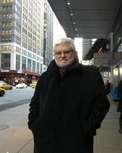 Chris
McDonnell, UK
Chris
McDonnell, UK
chris@mcdonnell83.freeserve.co.uk
Previous articles by Chris
Comments
welcome here
February
22, 2017
We
stand in awe
We
often hear the word ‘awesome’ in current use amongst young people. It
is an over used word that fills a space in a casual and colloquial manner.
Yet
only a few years ago, associated with the Iraq War, the phrase ‘shock
and awe’ was used to describe the huge impact of military might on
Bagdad
and the surrounding area. It was meant to describe the
shock induced by the attack and the awe it was supposed to produce in
those experiencing the bitter consequences.
It
is not that sense of ‘awe’ that I wish to explore, the awe produced by
naked power and aggression. Our awe and wonder in the presence of God is
something altogether different. We often hear about God, fine phrases
given in well-constructed sermons, polished words in books and articles,
all attempting to tell us something we didn’t know about our creator
God. Yet all never quite making it, getting ever so near but still
limited.
Many
years ago when I lived in
London
, there were occasions when I visited the Benedictine
Community at Quarr Abbey on the
Isle of Wight
. Founded
in the early 20th Century on the site on a medieval Cistercian
monastery by monks from Solesmes, the abbey offered guest rooms within the
Benedictine tradition. I stayed there a number of times.
One
occasion stands out in my memory. I was in my room when there was a knock
on the door. In came the Guest master, Dom Paul Zeigler, an Austrian monk
who had entered the abbey in 1944. He sat down and began to tell me a
story, of a time when he was a small boy growing up in a village in
Austria
. He told me that one morning he walked down to the
local church for mass, only to find a note pinned to a locked church door.
On it were hastily written words “Out on sick call, no mass today”.
A factual statement that told of a priest’s pastoral duties.
It
was Dom Paul’s comment to me that has remained. With his eyes almost
closed he told me that it was then that he realised the immense privilege
of sharing in the
Mass.
It wasn’t what he said but the manner in which he
delivered those few words that has remained with me.
Later
that day, when we were at supper in the refectory, my place at the guest
table was almost opposite one of the tables of monks where he sat. He had
finished his meal and was sitting with head slightly bowed and eyes
closed. On his forehead, a vein stood out quite markedly until the Abbot
knocked the table for the concluding grace.
Then,
in an instant, Dom Paul relaxed. I have always regarded those two
instances that day as one of the very few occasions when I have recognised
someone in a deep and personal manner experiencing the awesomeness of God.
The first was accompanied by a few words, the second by a silence and
stillness.
And
there is the rub. The awe that comes to us in the presence of God is
wordless, it is not about what we say, but who we are, who we allow
ourselves to be.
The
20th theologian, Karl Rahner who died in 1984, is often
remembered for his few words on our Christian experience. He said “In
the days ahead, you will either be a mystic (one who has experienced God
for real) or nothing at all”. The reality is an experience beyond
high flown words, it is about who we are, it is about relationships. On
another occasion Rahner said that “Knowing God is more important than
knowing about God.”
That
experience, that knowing, comes from the relationships we share from a
young age. I have almost finished a fine book by John Quinn, “This
place speaks to me”, an anthology of people and places. One passage
recounts the experience of Katie Martyn who grew up on a small island off
the
Galway
coast, Island Eddy. She recounts going to mass on the
mainland with these words.
“The
younger people went to Mass in Ballinderreen. A few times a year at low
tide there would be a dry strand when you could walk the mile or so to
Aran Pier, but otherwise six or seven of us would take the punt. If the
weather was rough we would go to Rihairne, walk to Aran in our wellies,
then put on our Sunday shoes and walk the couple of miles to Ballinderreen.
We would leave at
nine o’clock
to be on time for
eleven o’clock
Mass”. Wow, and
then there was the journey home as well. My own Godmother, Jenny, would
walk me to Sunday mass as a young boy in
South London
, only a twenty minutes journey, but I remember her
insistence that we “be on time”.
To
conclude with Karl Rahner again “Emptiness
is only a disguise for an intimacy of God’s, that God’s silence, the
eerie stillness, is filled by the Word without words, by Him who is above
all names, by Him who is all in all. And his silence is telling us that He
is here.”
END
---------------
 Chris
McDonnell, UK
Chris
McDonnell, UK Chris
McDonnell, UK
Chris
McDonnell, UK